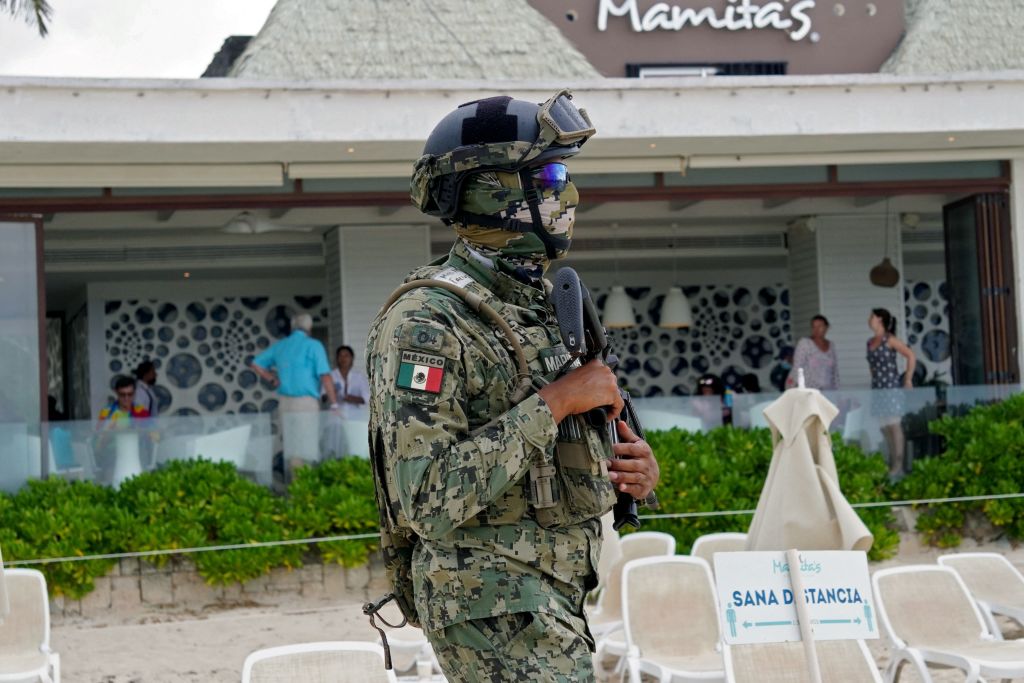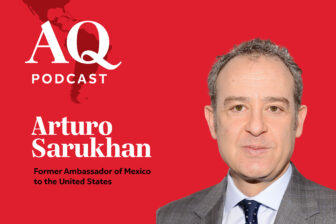MEXICO CITY — The expanding role of Mexico’s military under President Andrés Manuel López Obrador has come into especially sharp relief in recent weeks.
On March 21, just three days after López Obrador sent additional army troops to the northern state of Tamaulipas in response to a wave of violence there, the president’s top generals were on hand to inaugurate a new airport in Mexico City that was built and will be operated by the Mexican military.
Though he campaigned on a promise to de-militarize the government’s security strategy, since entering office in 2018, López Obrador has relied on military personnel for everything from infrastructure development and everyday public security to control of Mexico’s southern border. In January, the federal government had 204,923 troops deployed for security purposes, including those from the National Guard. That number was just 52,000 on average in 2011.
The negative consequences for human rights, democratic development and civil police capacity of Mexico’s overreliance on the military for security purposes have been well documented over the past 12 years. But López Obrador has taken militarization further to include a host of government functions not related to security. Some recent studies show how this strategy could have a detrimental effect on the armed forces themselves, eroding the public’s relationship with what has long been one of Mexico’s most trusted institutions.
In arguing for expanding the armed forces’ functions, López Obrador has emphasized public trust in these institutions. In July 2021 he presented an official survey that showed 88.3% of Mexicans trust the marines and 85% the army, compared to just 53% for state police and 46.9% for municipal police. These figures, however, oversimplify Mexican public opinion and overlook the ways in which trust in the military has changed in recent years and may change in the future.
A 2021 study by my colleagues Daniel Zizumbo-Colunga and Benjamín Martínez-Velasco at the Center for Research and Teaching in Economics (CIDE) points to important nuances. Their study shows how levels of trust in the military change depending on the tasks that the armed forces carry out. When shown images of soldiers at a checkpoint, for example, respondents’ trust in the military declined by 25%. When shown troops carrying out detentions or controlling a protest, it fell by 40%.
By contrast, images of military personnel carrying out the type of rescue and disaster relief missions that were central to their public role prior to the 21st century—saving a baby, for example—saw trust grow between 5% and 10%. The study further showed that while 69.4% of citizens agree with the use of the military to enforce public security in general, they distinguish between different forms of law enforcement. 89.7% agree with the military taking on the fight against drug cartels but only 55.3% agree that the military should participate in everyday law enforcement.
Other studies reinforce these findings. A poll by Parametria conducted when the creation of the National Guard was being discussed in Congress showed that 67% of people preferred the army watching over streets, while only 25% said they preferred the police. But when asked whether it would be better to have the military take over the functions of the police or to have states and municipalities strengthen their police, 58% of respondents chose the police.
Trust in the military is also affected by its deployment. The most recent Latinobarómetro results saw the number of Mexicans who reported having “a lot” of trust in the military fall to 13.8% in 2020, from 19% in 2010 and 28.1% in 2006. A full 35% of Mexicans said they had “little” trust in the military in 2020, a significant contrast from 2006 when only 22.3% reported the same.
While López Obrador may be right that trust in the military is higher than it is for civil police forces, overall trust in the armed forces appears to be at risk of decline. Rather than trying to increase confidence in those other institutions, López Obrador’s strategy risks bringing the military down to their level.
To be sure, the Mexican military’s role was expanding well before López Obrador’s election. Recent research from CIDE’s Drug Policy Program found that at least 246 civil functions have been given to the armed forces since 2006, when former President Felipe Calderón launched the “war on drugs” and deployed Mexico’s military across the country. But this trend has accelerated under López Obrador, in part through the National Guard, a new security force created by his administration in 2019. López Obrador initially proposed the National Guard as a military body, but Congressional opposition established it in the Constitution as a civilian police force, under control of civil authorities. Despite this, the president has carried out his original proposal in all but name. Today the National Guard is comprised overwhelmingly of soldiers and is controlled by the army.
The military character of the Guard is so apparent that López Obrador has said he will send a constitutional amendment to have it incorporated into the Ministry of Defense. This would mean giving the military constitutional powers to permanently carry out public security tasks, something expressly prohibited by the Constitution since 1857 and by several international instruments.
If López Obrador’s amendment succeeds, it will have perverse consequences both for security and for good governance. Since the armed forces are national security institutions, they are subject to more lax transparency laws than other government bodies. The CIDE Drug Policy Program study on increased military functions was unable to find information regarding allocated budgets or expenditures for 76% of public security functions assigned to the military.
And Mexico’s military are now everywhere. In February, a military band inaugurated the new federal legislature, where López Obrador’s Morena party holds a majority. The overwhelming presence of the armed forces on the podium of the national congress, unprecedented in recent history, was a signal to legislators who will soon be asked to vote on whether the military should be given constitutional powers over public security.
Trust in the armed forces and support for some militarized security strategies in Mexico is undeniable. But trust is not a static commodity—accusations of corruption or questions over respect for human rights can do irreparable harm to public confidence. For the armed forces, a permanent presence in civilian life risks wearing out an institutional image that took years to develop. For Mexico, the risk is to democratic institutions that have taken decades to build.
—
Pérez Correa is a criminal law researcher and professor at the Center for Research and Teaching in Economics (CIDE) and a columnist and board member for newspaper El Universal.







